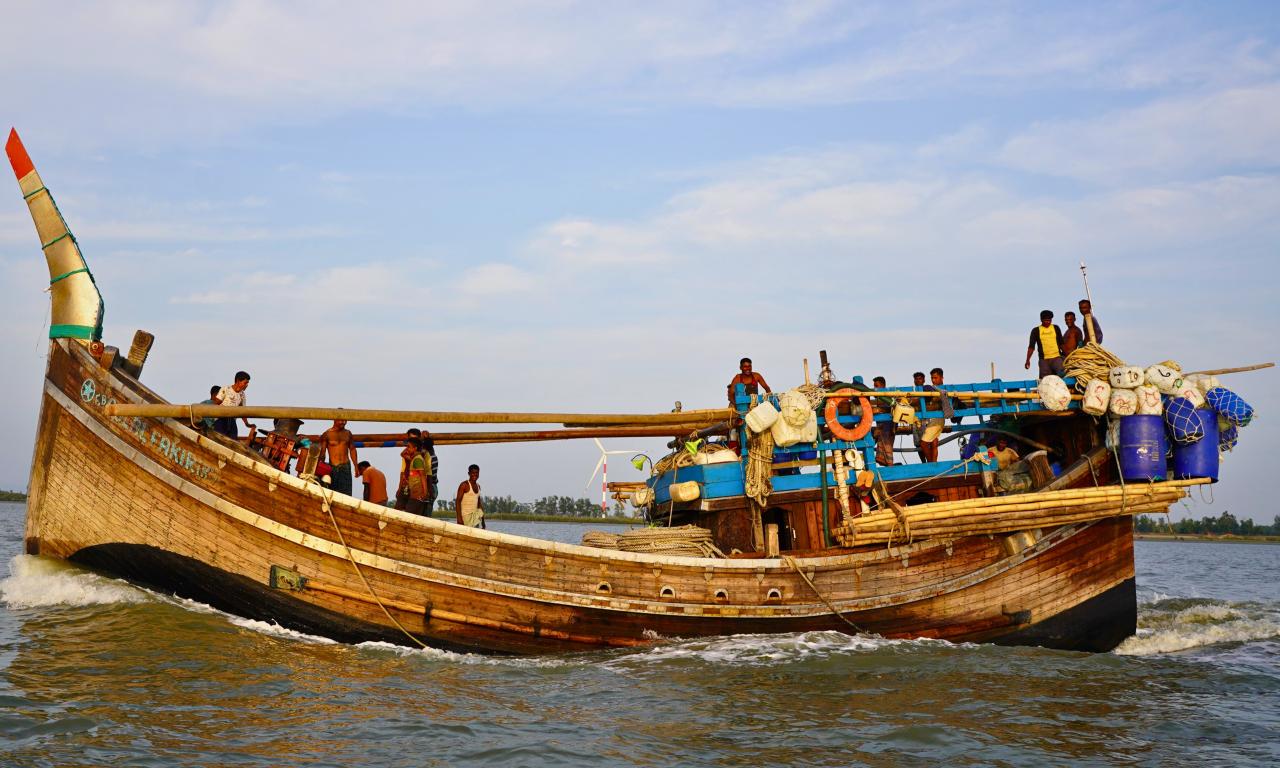
Bashir Ahmed, a fisherman from Bangladesh faces daily hardships familiar to many in coastal communities.
“I go to sea every day to catch fish, but the struggle doesn’t stop when I come back,” he says.
With a small family of four, including him, his wife, and two school-age children, Bashir’s life is a constant balancing act.
In Bangladesh, the government enforces an 80-day marine and hilsa fishing ban a year and provides 40 kg of rice per month as compensation to registered fishers. For those who receive it, rice isn’t enough to meet their basic needs.
“Not everyone has the card, and for those who do, the rice alone can’t sustain us. A human being can never survive on rice alone. We need other things,” Bashir explains. “I need to pay my children’s school fees. I do not want them to go to the sea, risking their lives or getting married early and depending on their husband’s income. I want them to have a decent life, a good job, like you all have, “he says.
Bashir’s story is not unique. It echoes the challenges faced by countless fishers across Bangladesh and other coastal communities around the world. Small-scale fisheries contribute significantly to global food security and livelihoods, supporting the nutrition of more than 1 billion people. Of the 120 million people engaged in capture fisheries around the world, over 90% work in small-scale fisheries. Despite their crucial role, these fishers often struggle with economic instability, limited access to resources for housing, and education.
In Bangladesh, fishing is a way of life, passed down from one generation to the next. But today, these communities face an uncertain future. Climate change, overfishing, and increasing regulatory restrictions (fishing ban periods) have made their survival more difficult than ever.
Building Better Support Systems for Coastal Communities
In Bangladesh, the Asia-Africa BlueTech Superhighway project (AABS) through its work area on incentives for coastal conservation and sustainable fisheries is working to strengthen incentives for coastal stewardship. One key approach is the use of social protection schemes that support fishers during the seasonal closures of hilsa fisheries where, for example, a national plan distributes rice to affected fishers to help supplement their food needs during the fishing ban.
The work area on incentives aims to build knowledge on both the opportunities and challenges of such social protection schemes, while also enhancing them by strengthening the institutional, legal, and policy frameworks related to coastal conservation and sustainable fisheries. Ultimately, the goal is to ensure that national social protection programs can better support hilsa fishers and help reduce the hardships they face during seasonal closures.
Putting Social Protection into Practice
Farhad, a fisherman from Cox’s Bazar, Bangladesh, has spent the last 17 years fishing in the Bay of Bengal. As the eldest of eight siblings, he became the family’s breadwinner at a young age. With few options available, he followed in his father’s footsteps and chose fishing as a way of life.
For Farhad, the sea is both a lifeline and a constant source of fear.
“On land, if someone’s in trouble, help is just a call away,” he says. “But out here, in a sea with no boundaries, no end.”
Every journey comes with risks such as storms, accidents, and engine failures, which could mean never making it back home.
Despite the ever-present danger, Farhad has less choices to make as livelihood apart from fishing. Even with the constant dangers, his income barely covers the cost of living, leaving him struggling to support his family through the difficult work he does each day.
Farhad's story reflects the daily struggles faced by countless fishers around the world who, despite their unwavering commitment, find themselves caught in a battle against forces beyond their control.
The Incentives for Coastal Conservation and Fisheries Management initiative under the Asia-Africa BlueTech Superhighway intends to support both people and nature to thrive together. For fishers like Farhad, this means creating systems that not only protect the environment but also support their livelihoods.
The goal is to provide incentives that enable and motivate communities to take better care of their coastal resources, ensuring they can continue to fish sustainably for years to come. By strengthening local governance, improving policies, and providing financial support, the initiative is making sure that the balance between conservation and livelihood is achievable.
Currently, in countries like Bangladesh, Mozambique, and Tanzania these efforts are helping communities adapt to the changing environment while preserving the rich marine ecosystems that are so crucial to their health and wellbeing.
For more information on AABS click here
